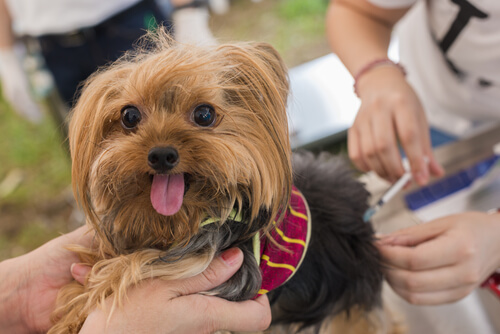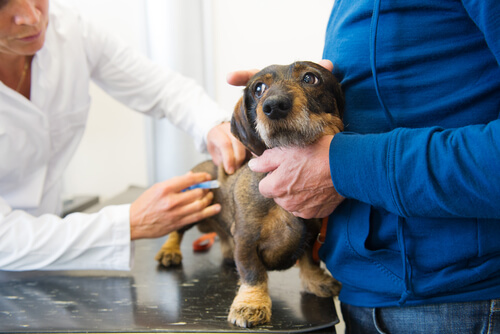Which Vaccines Does My Dog Need?

To avoid contracting certain infectious illnesses, pets need to get certain mandatory vaccines. There are also other optional vaccines that depend on the geographical location or the state of the animal’s health.
Mandatory vaccines and dog health
Puppies begin to get vaccinated at 12 weeks (approximately). Before this stage, the maternal antibodies may counteract the effects. Therefore, as soon as dogs stop consuming their mother’s milk, they can and should be vaccinated.

When you adopt or buy a dog, you usually receive a health certificate. And, a vet gives your dog a dose of mandatory vaccines. If the animal is not yet immune, it can’t have contact with others. Why? Well, this is because it’s more prone to catching sicknesses and infections.
When getting the vaccine, the dog receives a preparation of antigens for a specific virus. In this way, the body must react and act on those microorganisms so that they don’t keep reproducing.
After vaccinating the dog, he may suffer a decrease in cellular immunity. Basically, he could get sick (as with people getting vaccinated for the flu, for example). It’s essential that we protect them from viruses and bacteria. If in the future he’s in contact with the organisms causing the pathologies for which he was immunized, he will not catch it.
When a pet is vaccinated, it’s less likely that he’ll suffer serious or fatal diseases. In addition, transmission to people is avoidable, as in the case of rabies. Mandatory (and optional) vaccines should be given when the animal is healthy and in good condition. The side effects of vaccines are completely normal and even expected.
For example, he may have a fever in the hours following the vaccine, appearance of hives, rash or itching, especially in the area where the needle was placed, and he may develop cysts. In this last case, it’s either due to the animal not remaining still during the puncture, or because the liquid in the injection has not flowed through the blood. If it lasts for several days, we should take him to the vet.
What are the necessary vaccines for my dog
In Spain, at least, national regulations determine the calendar of vaccines. Likewise, each community has its different requirements (as is the case of Catalonia, the Basque Country and Galicia, where anti-rabies is voluntary). Therefore, it’s necessary to consult the veterinary clinic where you live. Basically, the mandatory injections protect the dogs from distemper, parvovirus and rabies. Regarding the optional ones, they do so to fight against leptospirosis, Kennel Cough and Lehshmaniosis, among other diseases.
The basic vaccination calendar for dogs in Spain is composed of:
- First vaccination: 6 weeks old
- Multipurpose: at 8 weeks.
- Reminder of the Multipurpose: at 12 weeks.
- Rabies: at 16 weeks.
- Multipurpose and rabies: every year.

The Multipurpose vaccine protects against the following illnesses (which is why it’s so important to reinforce the doses once every year):
- Canine distemper
- Canine infectious hepatitis (adenovirus 1)
- Leptospirosis
- Parvovirus
- Kennel Cough (adenovirus 2)
- Canine coronavirus
- Parainflueza
As for the rabies vaccine, the injection causes an immune response to the virus. So, the effects kick in about 2 weeks after the injection. The effectiveness is 100% if a vet does it correctly. And, it lasts for 1 year. The second injection usually lasts for 2 to 3 years.
To avoid contracting certain infectious illnesses, pets need to get certain mandatory vaccines. There are also other optional vaccines that depend on the geographical location or the state of the animal’s health.
Mandatory vaccines and dog health
Puppies begin to get vaccinated at 12 weeks (approximately). Before this stage, the maternal antibodies may counteract the effects. Therefore, as soon as dogs stop consuming their mother’s milk, they can and should be vaccinated.

When you adopt or buy a dog, you usually receive a health certificate. And, a vet gives your dog a dose of mandatory vaccines. If the animal is not yet immune, it can’t have contact with others. Why? Well, this is because it’s more prone to catching sicknesses and infections.
When getting the vaccine, the dog receives a preparation of antigens for a specific virus. In this way, the body must react and act on those microorganisms so that they don’t keep reproducing.
After vaccinating the dog, he may suffer a decrease in cellular immunity. Basically, he could get sick (as with people getting vaccinated for the flu, for example). It’s essential that we protect them from viruses and bacteria. If in the future he’s in contact with the organisms causing the pathologies for which he was immunized, he will not catch it.
When a pet is vaccinated, it’s less likely that he’ll suffer serious or fatal diseases. In addition, transmission to people is avoidable, as in the case of rabies. Mandatory (and optional) vaccines should be given when the animal is healthy and in good condition. The side effects of vaccines are completely normal and even expected.
For example, he may have a fever in the hours following the vaccine, appearance of hives, rash or itching, especially in the area where the needle was placed, and he may develop cysts. In this last case, it’s either due to the animal not remaining still during the puncture, or because the liquid in the injection has not flowed through the blood. If it lasts for several days, we should take him to the vet.
What are the necessary vaccines for my dog
In Spain, at least, national regulations determine the calendar of vaccines. Likewise, each community has its different requirements (as is the case of Catalonia, the Basque Country and Galicia, where anti-rabies is voluntary). Therefore, it’s necessary to consult the veterinary clinic where you live. Basically, the mandatory injections protect the dogs from distemper, parvovirus and rabies. Regarding the optional ones, they do so to fight against leptospirosis, Kennel Cough and Lehshmaniosis, among other diseases.
The basic vaccination calendar for dogs in Spain is composed of:
- First vaccination: 6 weeks old
- Multipurpose: at 8 weeks.
- Reminder of the Multipurpose: at 12 weeks.
- Rabies: at 16 weeks.
- Multipurpose and rabies: every year.

The Multipurpose vaccine protects against the following illnesses (which is why it’s so important to reinforce the doses once every year):
- Canine distemper
- Canine infectious hepatitis (adenovirus 1)
- Leptospirosis
- Parvovirus
- Kennel Cough (adenovirus 2)
- Canine coronavirus
- Parainflueza
As for the rabies vaccine, the injection causes an immune response to the virus. So, the effects kick in about 2 weeks after the injection. The effectiveness is 100% if a vet does it correctly. And, it lasts for 1 year. The second injection usually lasts for 2 to 3 years.
This text is provided for informational purposes only and does not replace consultation with a professional. If in doubt, consult your specialist.








